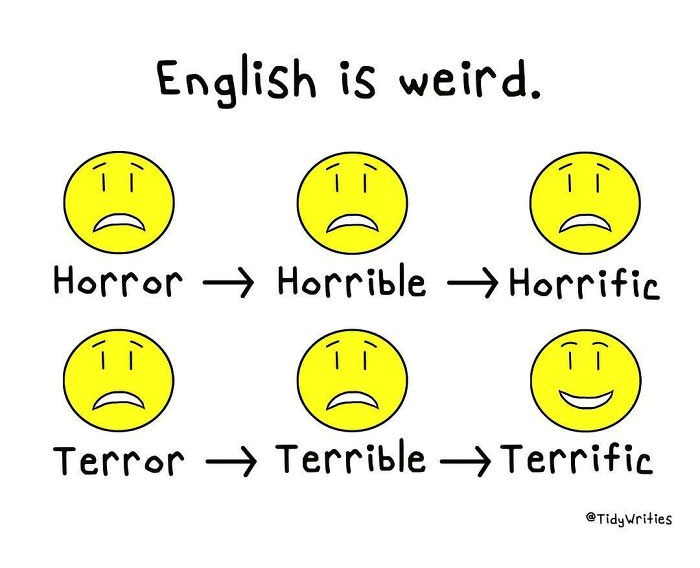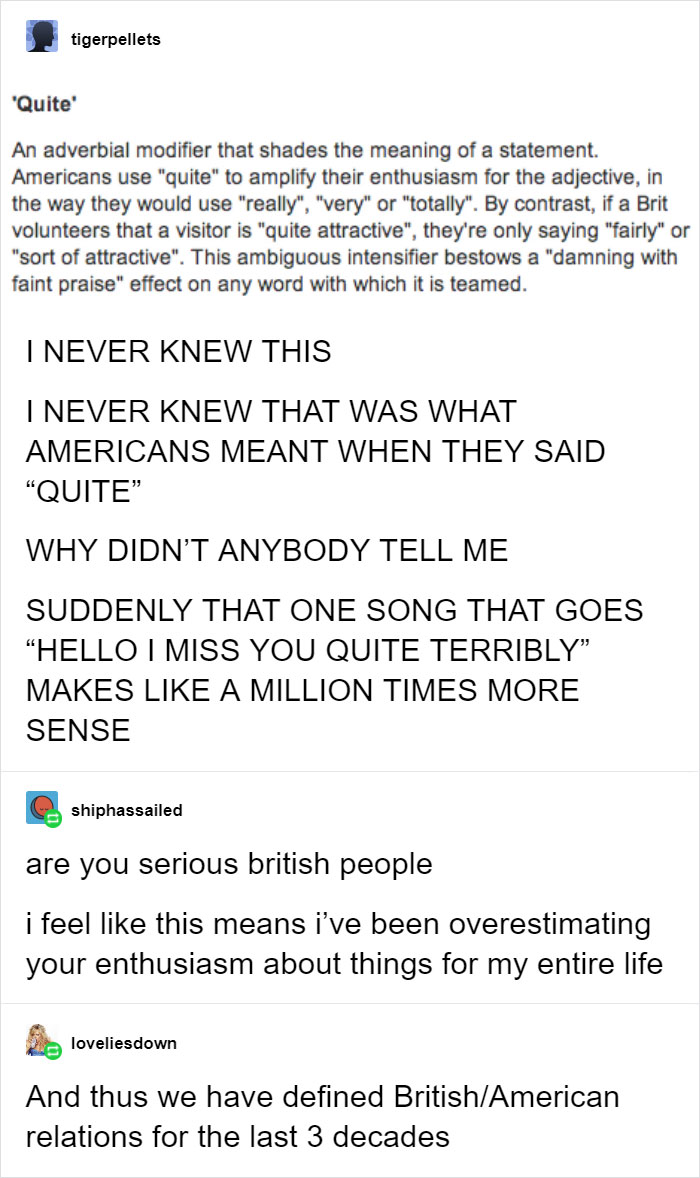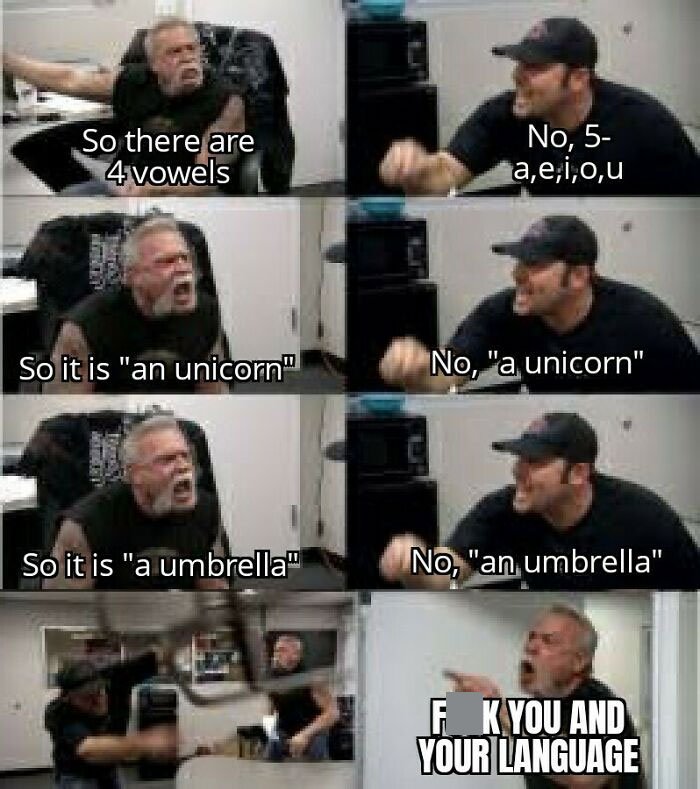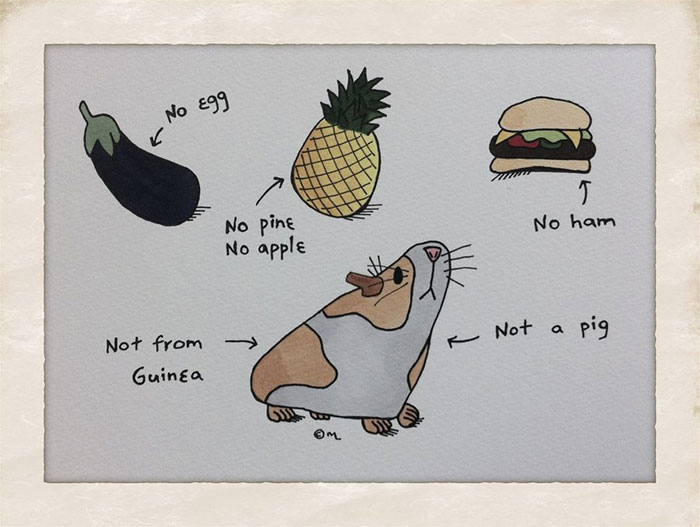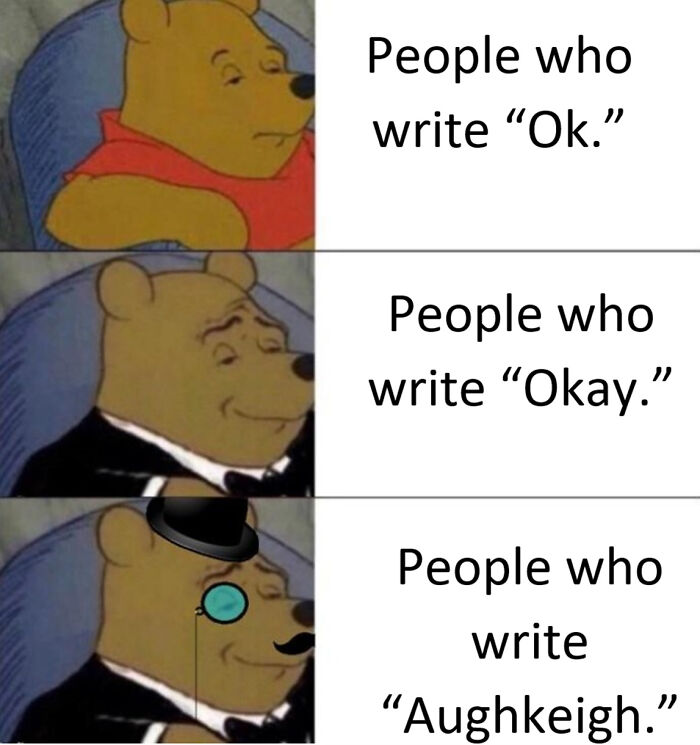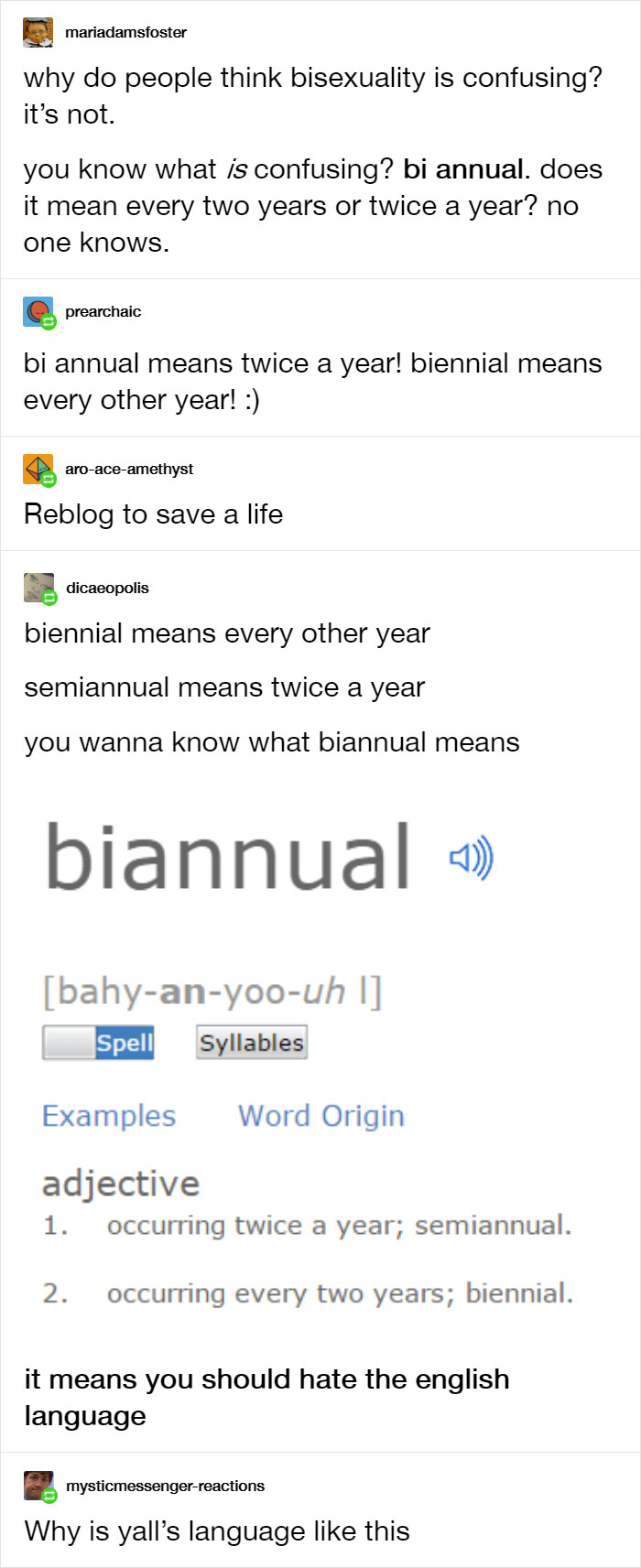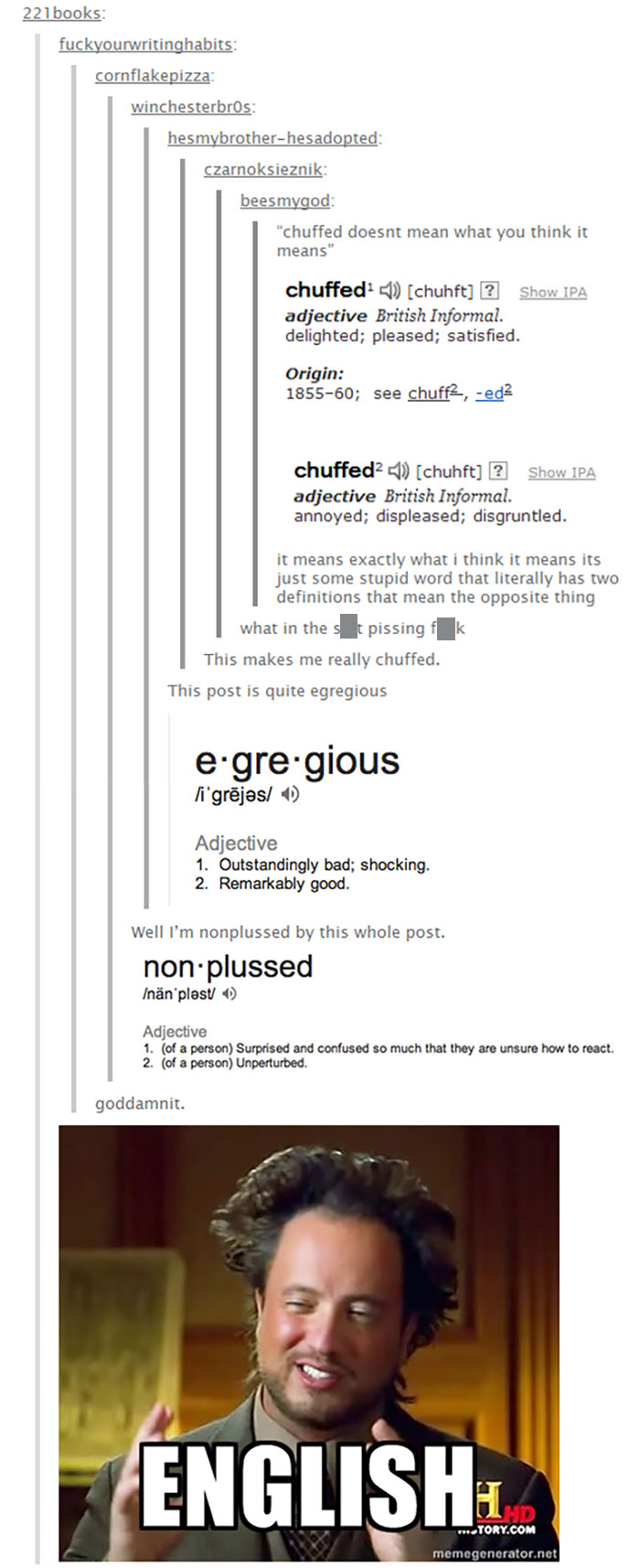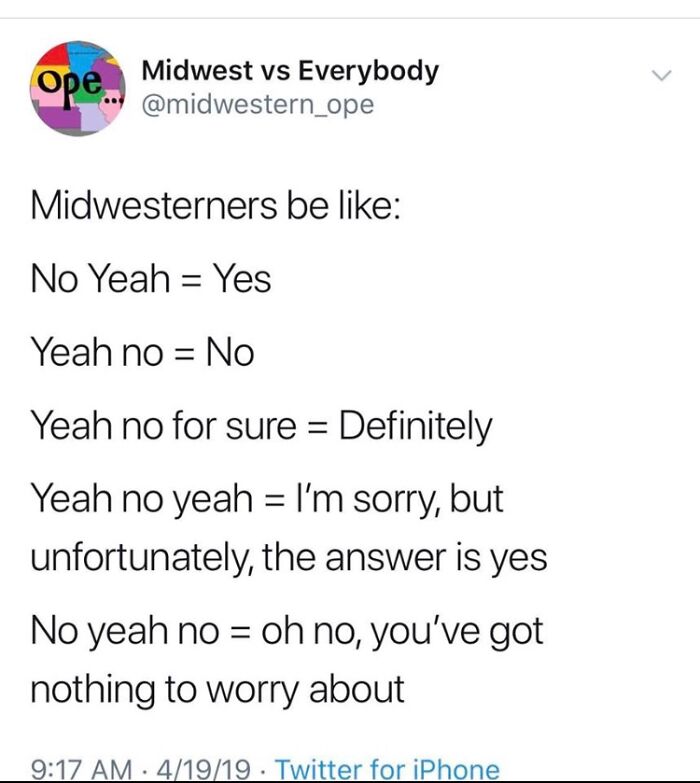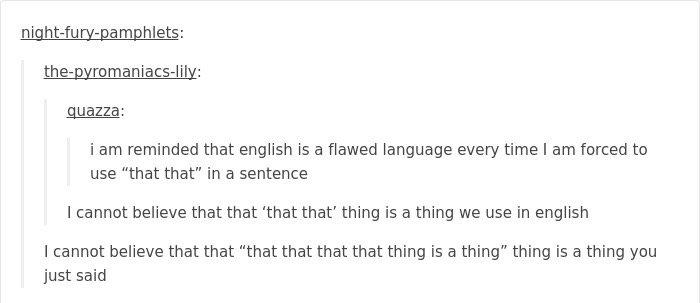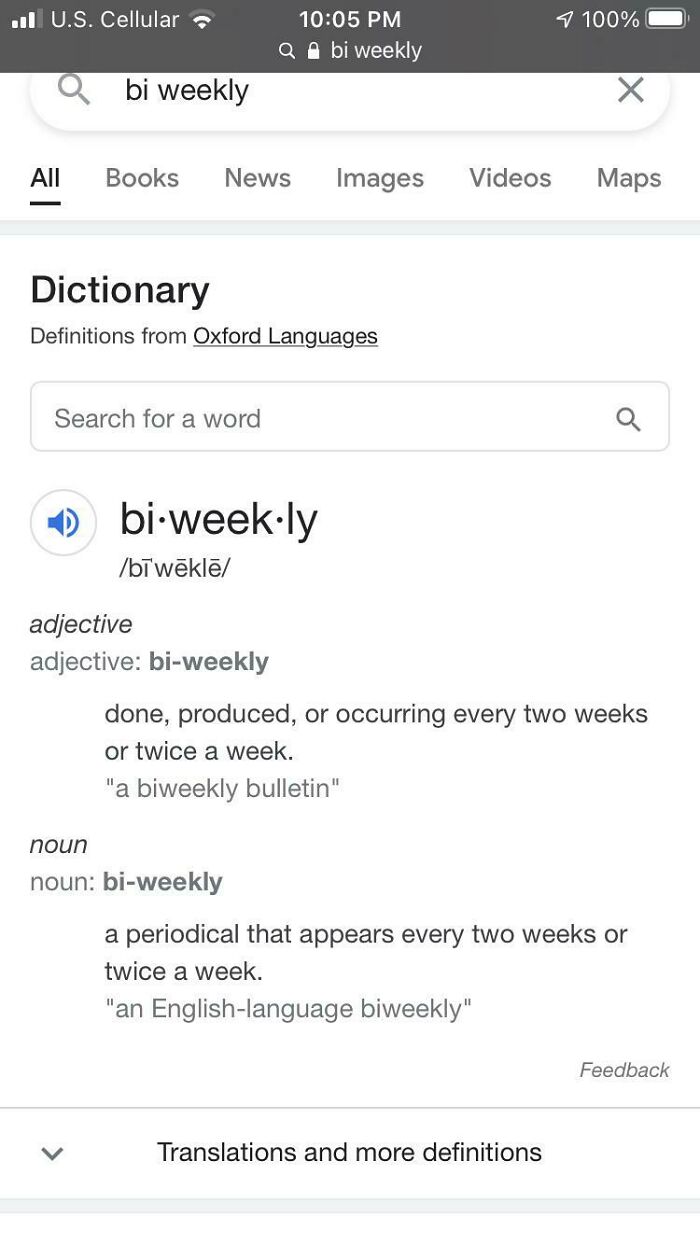I absolutely adore the English language with all of its ups and downs, twists and turns, astounding hyperboles and alliterative inclinations. And let's not forget the puns! However, it's no secret that the language can be a tad… discombobulating for new students, anyone who's learning English as a second language, and native speakers alike.
To show you what we mean, the literature-loving philology fans here at Bored Panda have collected the most hilarious and honest examples of people showing how frustrating the English language can be for them. Have a read below, upvote your fave posts, and remember to share your own experience with the exciting journey that is learning English.
This post may include affiliate links.
During an earlier interview, I spoke to Dr. Lisa McLendon about the difficulties that foreign students face when learning English, as well as how to keep our linguistic skills sharp. Dr. McLendon is the News and Information Track Chair at the University of Kansas School of Journalism and Coordinator at the Bremner Editing Center.
According to Dr. McLendon, a lot of the difficulties that foreign students face depend on the languages that they already know. Those who know languages similar to English in their structure and logic will have an easier time.
“For students whose native language lacks articles (a, an, the), articles are by far the hardest category of words to master. Verb tense/aspect is also really hard—the difference between ‘I read,' ‘I am reading,' and ‘I do read' is nonexistent in many other languages,” the language expert explained.
Yeah but that's true for every language. You rarely have "full" synonyms that are completely interchangeable in every context (non-native speakers are generally detectable by breaking unspoken context rules) . Apart from minute differences in meaning, most words also have meanings beyond the thing they describe, such as opinion.
Just memorizing common words doesn't help overcome these linguistic barriers. What needs to happen is for the student in question to completely shift their mindset. That and practice things until the quirks of the English language become second nature to them.
“These don't pose any difficulties for native speakers who use them correctly without even thinking about it,” Dr. McLendon said about the linguistic nuances.
It's not just foreign speakers that have issues with the language, though. The professor highlighted that in her experience as an editor and an educator, she found that native speakers have trouble with past passive participles in speech (e.g. saying ‘I had went').
What's more, when it comes to writing, native speakers have issues with punctuation, homophones (e.g. peek vs. peak), and misplaced modifiers.
Dr. McLendon suggested that nobody rest on their laurels. Learning's a lifelong mission and improving our English skills is no exception. And if we want to keep our minds well-honed and our quills sharp, then we're going to have to get some good habits under our belts.
“Read! Read widely and frequently. Read magazines, newspapers, novels, even cereal boxes,” the language expert told Bored Panda. “But be careful when scrolling through social media, which although it can give you a good idea of current slang and shorthand, it's often not a great model of clarity, accuracy, or good grammar.”
When it comes to pronunciation, though, Dr. McLendon pointed out that both native speakers and foreign students alike have problems with it. Especially when we're talking about less common words like ‘epitome.'
“I've known lots of people who learned words by reading, not by hearing, and so had no idea how they were pronounced. But for people learning English, pronunciation can be a real nightmare,” the professor said.
I was taking a TEFL (Teaching English as a foreign Language) qualification in Japan, and one of the exercises I had to do was read to a class of students. The one word that stuck in my mind was black bird versus blackbird. The difference is so subtle, but I hadn't given it any thought until you had to explain the difference.
My English teacher taught me not to use "handy" in English because it would be a derogatory term for handicapped people. Is that true?
“We have words that are spelled similarly but pronounced differently (bomb/comb/tomb) and words that are spelled differently but sound the same (peek/peak/pique). Plus, English has a lot of words that have silent letters, which can be confusing.”
And here is another strange "Americdnism" I spit my cereal, I would say I spat my cereal...
Whoever came up with those names for the hair colors were color blind
Dr. McLendon was candid that English is much more chaotic than other languages in terms of how spelling reflects pronunciation and vice versa. “English is a Gallic overlay on a Germanic base, plus it has borrowed liberally from languages all around the world throughout its development,” she told Bored Panda.
I have a medical condition which resulting in tearing of the cornea. When I write that, people sometime get confused. My cornea doesn't produce liquid, it rips apart and is excruciatingly painful, but tearing can make it feel a little better because the liquid lubricates and protects the tear.
And the B in tomb is silent, and the E in time is silent, and the T in often is silent, and the H in honor is silent, how do you pronounce BETH? It's all silent letters!
“When a word comes into English, where it comes from, and when a spelling gets standardized all affect how a word is written in relation to how it sounds. Other languages may not be exactly ‘spelled like it sounds' but have set patterns of how pronunciation does not correspond with spelling.”
Because the Frigidaire brand became so popular that “fridge” was used as the term for all refrigerators.
Why do Americans say dove instead of dived? He dived into the pool, not he dove into the pool. That is what I was taught at school anyway. Also hanged and hung He was hanged from the tree, not he was hung from the tree. Is this a specifically American thing. No offence, just genuinely would like to know.
The country’s starting letter(s) switched from ‘f’ to ‘ph’ when Spanish rule was replaced by American rule. No idea why the same did not happen to the demonym, however.
The whole country has remained this weird mix of English-speaking Hispanics ever since, I guess.
Load More Replies...I do think that if you stress out about something like this twice a month, you probably do not have a lot to stress about. The good life! 😉
As an added bonus attraction, there are several sets of letters that are often switched: b/v, p/f, and m/n being most common. While there in the military, I once heard Dracula described as a bonfire :-)
The word “Filipino” is spelled with an “f” because it’s derived from the Spanish name for the Philippine Islands: las Islas Filipinas. Originally, after Magellan’s expedition in 1521, the Spanish called the islands San Lázaro, according to the Oxford English Dictionary. But in 1543 the Spanish renamed them las Islas Filipinas, after King Philip II. (“Philip” is Felipe in Spanish.) In English, however, the name was translated from the Spanish as “the Philippine islands” or “the Philippines.” The earliest published reference in the OED is from Samuel Purchas’s Pilgrimage (1613): “Those Islands, which more properly beare the Philippine title.” And here’s another early citation, from Nathaniel Crouch’s The English Empire in America (1685): “A great Ship called the St. Anna expected from the Philippine Islands.” The country is now known as the Republic of the Philippines, but the Spanish spelling was retained for “Filipino.” The word is an adjective as well as a noun.
I also REALLY hate that in my native language (Dutch) we write the name of the country with 1 P (Filipijnen) and the name of the capital with 2 Ls (Manilla) amd then I switch to English and for whatever reason the country name has double P but the name of the capital only has one L in it. And of course I can't keep them apart so I need to look it up every single time. This comment was no exception to that.
Never mind ‘Netherlands’ and ‘Dutch’. I’ve been asked so many times why they’re so different as if I’ve created the language 😄
Dutch has the same root as Deutsch (German). Dutch language developed separately from Low German after their independence but they've kept the word :)
Load More Replies...As a Filipino...I really didn't know. Then there's the Filipino vs Pilipino xD
I'm not sure I've written Filipino down before today. I've now added filipino at 167th things to worry about.
Human was first recorded in the mid 13th century, and owes its existence to the Middle French humain “of or belonging to man.” That word, in turn, comes from the Latin humanus, thought to be a hybrid relative of homo, meaning “man,” and humus, meaning “earth.” Thus, a human, unlike birds, planes, or even divine spirits up above, is a man firmly rooted to the earth
I am constantly amazed by native speakers of English who are complaining how complicated other languages are.
I'm a native German speaker and currently trying to learn French, and honestly, English is a lot easier. The basic grammar rules aren't difficult, and you can pick everything else up from reading and listening.
Load More Replies...To me, "next Monday" means the very next Monday on the calendar. To my wife that is "this Monday" and "next Monday" is the Monday after "this Monday." But if you ask her when the "Monday after next" is, she'll tell you the same date as "next Monday".
How about "lets move that appointment forward one week". Does it get moved to a later date or an earlier date? Depends on who you ask.
Load More Replies...Honestly, English is the easiest and most practical language I've studied. No morphological declination. Try Latin, Arabic, or even German. Even French was more difficult to me, and I'm native in Italian so they're quite close.
A comedian (I forget which one) claimed that English started as a practical joke that got taken too seriously.
I'm a non-native speaker who learned English mostly via reading. Every time I read one of these "isn't it odd how X and X are spelled the same but pronounced different" my reaction is "wait, they're not?" and then I google it and then I question reality as a whole.
I have mentioned it before and I will mention it again but I urge anyone interested to try and read "The Chaos" https://pages.hep.wisc.edu/~jnb/charivarius.html
I am a native English speaker and this really puts things into perspective. And when I mean "puts it into perspective," then I mean just how stupid the language really sounds. I really wish I could help you guys a little more on this because I know some tricks.
Something that always bothered me is the pronounciation of danger and anger.. why is it pronounced so differently with "d" being the only difference?!
Danger - from Old French dangier into Middle English. Anger - from Old Norse angr/angra into Middle English. Them being spelled similar in Modern English is pretty much an accident of evolving language, simiar to laughter/slaughter.
Load More Replies...The next time someone criticizes me for being an American who only speaks one language, I'll remind them that the language I speak is English. And English is at least 5 languages.
But but but....then how many languages does it count for those who speak English as a 2nd language?
Load More Replies...I'm trying to learn French and it's just as difficult. Maybe I shouldn't have moved to France just yet...
Ah yes, French: A language in which the last 0-4 letters are irrelevant, but you never know when or how many.
Load More Replies...I've always wondered how you can sit down and sit up at the same time.
I love the English language. It is so beautiful; crazy but beautiful. I love the way we can trace words historically to different groups of people who invaded the U.K. and assimilated their language into what was already there.
All true... However... I went, you went we went, they went, she went etc . Some parts are really simple
Even though my first language is English, I lost many brain cells from this.
No. is short for Latin "numero". Lb is short for Latin "libra", a unit of mass in the Roman Empire.
Load More Replies...Buffalo buffalo Buffalo buffalo buffalo buffalo Buffalo buffalo. I actually spent a class at university studying this sentence. For a brief moment in history I could explain it but my brain has now moved on.
I looked it up and a Reddit user said this: Buffalo has three meanings in American English; the adjunct noun "Buffalo" is the city in New York, the noun "buffalo" is the plural and singular name of the American bison, and the verb "buffalo" means "to outwit or confuse". The sentence itself uses some trickery in order to remain grammatically correct. It uses two clauses in grammar, the reduced relative clause and the restrictive clause, that allow it to go without commas or joining words. The sentence means that the Buffalo buffalo (the bison in the city of Buffalo, New York) are intimidating other bison in their city through the use of bullying, and are in turn being bullied back. A more accurate sentence might be; "Buffalo buffalo, that Buffalo buffalo buffalo, buffalo Buffalo buffalo." Or "Bison from the city, that bully bison from the city, are being bullied by Bison in the city."
Load More Replies...American's speak an almost undecipherable language but live in cities laid out on simple grids. Czech is pronounced exactly as its spelled, which is good if you're trying to find your way around the maze that is Prague.
Not all US cities are nice organized grids, try Boston for instance.
Load More Replies...As a counterpoint, there's https://xkcd.com/191/ where "Lojban" is a constructed language (like Esperanto but) designed to be syntactically unambiguous and take away most of the confusion above. The comic goes "If you learned to speak Lojban, your communication would be completely unambiguous and logical"... "Yeah, but it would all be with the kind of people who learn Lojban" [and clicking on the image of course gives the joke in Lojban]. This goes to the Sapir-Whorf hypothesis: Does the English language's ambiguity make the speakers ambiguous, does the language force you to look at things multiple ways? Or is the opposite true, is there a certain ambiguous look at the world that has caused these ambiguities? (See also: puns, which are far far rarer in most other languages.)
Like the actor Sean Bean. Shouldn't it be pronounced either as 'Shaun Born' or 'Sheen Been'?
Also, Sean is actually Gaelic and not English. Sean (Irish), Sion (Welsh), Sian (Scottish). Shaun (English) and Shawn (American). The name Shaun is the just Gaelic version of John. I wonder if the girls I have seen called Sean know they are actually called John?
Load More Replies...This post perfectly captures the essence of the English language - a delightful mess of quirks and complexities! I love how it celebrates the beauty of its rich vocabulary (alliteration, hyperbole, puns!) while acknowledging the challenges it presents to learners. Sharing our frustrations and funny encounters with the language can be a great way to bond and find humor in the learning process. Can't wait to read the hilarious examples and share my own experiences in the comments below!"
These are hilarious. The one about naked and baked is commented on my previous head of news at my campus radio station in South Africa. She is also a published author. Wow she made it onto buzzfeed. The only this that is upsetting about the post is the guys who comments on her name and calls it a sound a toilet makes. Given that her name is a Black Xhosa name it's quite insulting that he compares her name and identity to something dirty. If that part could be cut out, the rest is hilarious.
I'd you enjoyed this article, please follow the wonderful @susie_dent on twitter. She's a lexicographer and author with a great sense of humour.
And this is why English is one of the hardest languages to learn for other countries. Maybe not the language itself but for sure the grammar.
Actually, you can learn basic English communication quite easily, much more difficult in other languages. Believe me, I'm Hungarian.
Load More Replies...Well, that kind of things existe in many languages, especially European ones since they are a big mix of multiples languages that got mixed over time. Personally I think English is one of the simplest to learn; compare all above with French, or German and you'll find a lot more complexities , and then even more.
As I native speaker I too am glad I don’t have to learn English as a second language, and in fact, as a professional writer, I delight in all of the difficulties all of you express, and naturally take them for granted. But I suggest that many of you equally take for granted similar confusibles in your native tongues that pose difficulties for foreigners. In Italian, a gendered language, I’m frequently stumped by the four forms of the plural; the multiple definite articles (the gendered ‘il’ and ‘la’--and the neutered ‘lo’ for words beginning with the ‘impure s’, such as ‘spumante’). Not to mention the forms of formal address, at least one of which is capitalized and so can’t be recognized for certain unless in written form. 9cont'd)
I thought I was becoming good at English. Then I read this post. It feels like I'm still at the very first step with vocabulary and pronunciation. I think I will go digging my grave of shame.
Ignore most of this post, it's riddled with inaccuracies and bull. You can do English :D
Load More Replies...I always used to call it "dove" that sounded like "cove". And then one day I heard a teacher call it a "dove" that rhymed with "love" and I was mindblown. And also "Vase". I thought it rhymed with "base", but turns out it's "vase" and sounded a bit like "cause". Honestly I don't know how I coped with English.
The issue here is that English has more than five vowel sounds - it's like, what, 14 or 15? - but only five letters to represent all of those sounds. Other languages put stuff over the vowels to denote length and tone but English doesn't. Ah, I'd still take the vowel mess over some Latin grammar any day.
Load More Replies...The most confusing thing that I can think of right now is when someone says something like "You don't want to lose money , don't you?" (Or something like that, I not sure but it's when you need to respond with agree or disagree ) I was told, The proper way to agree with that sentence is to say "No, I don't want to lose money" My teacher said because it's negative. (I'm still confused) But my instinct is to said "Yes" because it's agreeing and my mother language is like that. (Now I'm simply use "I agree/disagree " rather than Yes/No) I'm gonna be very thankful if someone want to educate me in this one, or any suggestions on how to research/ look up. I have been desperately trying to understand it. (I have IELTS 8 on reading but just 5.5 on speaking)
I once pronounced soot as soooot (long o, that is) and was corrected. Double o before t was a short o. My reply? "Boot"
Because the letter locations and following vowels modify the sound. English grammar rules and vowel sounds!
Load More Replies...As a side note, I went most of my childhood thinking "snuck" was the past-tense of "sneak". I said it with regularity for many years before one day going "Wait. Why do book always say 'sneaked' when it's snuck?" Writing "snuck" still feels weird, but if I'm talking I cringe when I have to say "sneaked".
Snuck is the past tense of sneak if the verb is treated as irregular, sneaked when treated as regular. I use snuck mostly, meh.
Load More Replies...And then, of course all living languages have slang and idioms which, taken together with the standard language from which they derive, produce a means of expression that is vital and vigorous, poetic and potent, in proportion to its frequency of use and geographic distribution, among other influences. All of this is a result in the end of human nature, so I propose that we deal with it; God gave us brains, let’s use ‘em. But if you insist, like #34gh above, that you are genuinely stressed out—“at least twice a month”!!!!—by a minor wrinkle like “Philippines” vs. “Filipino,” then you are being either embarrassingly melodramatic or headed for total crack-up when you learn, as you are about to right now, that at least some natives of that island nation use the spelling Pilipino instead. If the latter, see Chapter 5 of “1984,” in which George Orwell introduces, Newspeak—the only language whose vocabulary is constantly shrinking. Might be just your cup of tea.
English is an ad lib form of communication intended to convey a meaning...if it does that then it is sufficient..
I think this thread is proof that early elementary teachers, who are expected to teach a room full of small children to read and spell all this nonsense, deserve to be paid about $1,000,0000 a year!
This thread is mostly bull turd mixed with dog doo though and doesn't demonstrate anything except that people who haven't studied linguistics need to study linguistics before talking about it.
Load More Replies...SAM SHOT was shot by a bullet, one that he didn't fie. . If the bullet hit Sam Shot then he didn't shoot. This can be stated as: If the shot shot Shot Shot shot not. Once again: If the shot (bullet) shot (hit) Shot (Sam Shot) Shot (Sam Shot) shot (fired) not.
I am constantly amazed by native speakers of English who are complaining how complicated other languages are.
I'm a native German speaker and currently trying to learn French, and honestly, English is a lot easier. The basic grammar rules aren't difficult, and you can pick everything else up from reading and listening.
Load More Replies...To me, "next Monday" means the very next Monday on the calendar. To my wife that is "this Monday" and "next Monday" is the Monday after "this Monday." But if you ask her when the "Monday after next" is, she'll tell you the same date as "next Monday".
How about "lets move that appointment forward one week". Does it get moved to a later date or an earlier date? Depends on who you ask.
Load More Replies...Honestly, English is the easiest and most practical language I've studied. No morphological declination. Try Latin, Arabic, or even German. Even French was more difficult to me, and I'm native in Italian so they're quite close.
A comedian (I forget which one) claimed that English started as a practical joke that got taken too seriously.
I'm a non-native speaker who learned English mostly via reading. Every time I read one of these "isn't it odd how X and X are spelled the same but pronounced different" my reaction is "wait, they're not?" and then I google it and then I question reality as a whole.
I have mentioned it before and I will mention it again but I urge anyone interested to try and read "The Chaos" https://pages.hep.wisc.edu/~jnb/charivarius.html
I am a native English speaker and this really puts things into perspective. And when I mean "puts it into perspective," then I mean just how stupid the language really sounds. I really wish I could help you guys a little more on this because I know some tricks.
Something that always bothered me is the pronounciation of danger and anger.. why is it pronounced so differently with "d" being the only difference?!
Danger - from Old French dangier into Middle English. Anger - from Old Norse angr/angra into Middle English. Them being spelled similar in Modern English is pretty much an accident of evolving language, simiar to laughter/slaughter.
Load More Replies...The next time someone criticizes me for being an American who only speaks one language, I'll remind them that the language I speak is English. And English is at least 5 languages.
But but but....then how many languages does it count for those who speak English as a 2nd language?
Load More Replies...I'm trying to learn French and it's just as difficult. Maybe I shouldn't have moved to France just yet...
Ah yes, French: A language in which the last 0-4 letters are irrelevant, but you never know when or how many.
Load More Replies...I've always wondered how you can sit down and sit up at the same time.
I love the English language. It is so beautiful; crazy but beautiful. I love the way we can trace words historically to different groups of people who invaded the U.K. and assimilated their language into what was already there.
All true... However... I went, you went we went, they went, she went etc . Some parts are really simple
Even though my first language is English, I lost many brain cells from this.
No. is short for Latin "numero". Lb is short for Latin "libra", a unit of mass in the Roman Empire.
Load More Replies...Buffalo buffalo Buffalo buffalo buffalo buffalo Buffalo buffalo. I actually spent a class at university studying this sentence. For a brief moment in history I could explain it but my brain has now moved on.
I looked it up and a Reddit user said this: Buffalo has three meanings in American English; the adjunct noun "Buffalo" is the city in New York, the noun "buffalo" is the plural and singular name of the American bison, and the verb "buffalo" means "to outwit or confuse". The sentence itself uses some trickery in order to remain grammatically correct. It uses two clauses in grammar, the reduced relative clause and the restrictive clause, that allow it to go without commas or joining words. The sentence means that the Buffalo buffalo (the bison in the city of Buffalo, New York) are intimidating other bison in their city through the use of bullying, and are in turn being bullied back. A more accurate sentence might be; "Buffalo buffalo, that Buffalo buffalo buffalo, buffalo Buffalo buffalo." Or "Bison from the city, that bully bison from the city, are being bullied by Bison in the city."
Load More Replies...American's speak an almost undecipherable language but live in cities laid out on simple grids. Czech is pronounced exactly as its spelled, which is good if you're trying to find your way around the maze that is Prague.
Not all US cities are nice organized grids, try Boston for instance.
Load More Replies...As a counterpoint, there's https://xkcd.com/191/ where "Lojban" is a constructed language (like Esperanto but) designed to be syntactically unambiguous and take away most of the confusion above. The comic goes "If you learned to speak Lojban, your communication would be completely unambiguous and logical"... "Yeah, but it would all be with the kind of people who learn Lojban" [and clicking on the image of course gives the joke in Lojban]. This goes to the Sapir-Whorf hypothesis: Does the English language's ambiguity make the speakers ambiguous, does the language force you to look at things multiple ways? Or is the opposite true, is there a certain ambiguous look at the world that has caused these ambiguities? (See also: puns, which are far far rarer in most other languages.)
Like the actor Sean Bean. Shouldn't it be pronounced either as 'Shaun Born' or 'Sheen Been'?
Also, Sean is actually Gaelic and not English. Sean (Irish), Sion (Welsh), Sian (Scottish). Shaun (English) and Shawn (American). The name Shaun is the just Gaelic version of John. I wonder if the girls I have seen called Sean know they are actually called John?
Load More Replies...This post perfectly captures the essence of the English language - a delightful mess of quirks and complexities! I love how it celebrates the beauty of its rich vocabulary (alliteration, hyperbole, puns!) while acknowledging the challenges it presents to learners. Sharing our frustrations and funny encounters with the language can be a great way to bond and find humor in the learning process. Can't wait to read the hilarious examples and share my own experiences in the comments below!"
These are hilarious. The one about naked and baked is commented on my previous head of news at my campus radio station in South Africa. She is also a published author. Wow she made it onto buzzfeed. The only this that is upsetting about the post is the guys who comments on her name and calls it a sound a toilet makes. Given that her name is a Black Xhosa name it's quite insulting that he compares her name and identity to something dirty. If that part could be cut out, the rest is hilarious.
I'd you enjoyed this article, please follow the wonderful @susie_dent on twitter. She's a lexicographer and author with a great sense of humour.
And this is why English is one of the hardest languages to learn for other countries. Maybe not the language itself but for sure the grammar.
Actually, you can learn basic English communication quite easily, much more difficult in other languages. Believe me, I'm Hungarian.
Load More Replies...Well, that kind of things existe in many languages, especially European ones since they are a big mix of multiples languages that got mixed over time. Personally I think English is one of the simplest to learn; compare all above with French, or German and you'll find a lot more complexities , and then even more.
As I native speaker I too am glad I don’t have to learn English as a second language, and in fact, as a professional writer, I delight in all of the difficulties all of you express, and naturally take them for granted. But I suggest that many of you equally take for granted similar confusibles in your native tongues that pose difficulties for foreigners. In Italian, a gendered language, I’m frequently stumped by the four forms of the plural; the multiple definite articles (the gendered ‘il’ and ‘la’--and the neutered ‘lo’ for words beginning with the ‘impure s’, such as ‘spumante’). Not to mention the forms of formal address, at least one of which is capitalized and so can’t be recognized for certain unless in written form. 9cont'd)
I thought I was becoming good at English. Then I read this post. It feels like I'm still at the very first step with vocabulary and pronunciation. I think I will go digging my grave of shame.
Ignore most of this post, it's riddled with inaccuracies and bull. You can do English :D
Load More Replies...I always used to call it "dove" that sounded like "cove". And then one day I heard a teacher call it a "dove" that rhymed with "love" and I was mindblown. And also "Vase". I thought it rhymed with "base", but turns out it's "vase" and sounded a bit like "cause". Honestly I don't know how I coped with English.
The issue here is that English has more than five vowel sounds - it's like, what, 14 or 15? - but only five letters to represent all of those sounds. Other languages put stuff over the vowels to denote length and tone but English doesn't. Ah, I'd still take the vowel mess over some Latin grammar any day.
Load More Replies...The most confusing thing that I can think of right now is when someone says something like "You don't want to lose money , don't you?" (Or something like that, I not sure but it's when you need to respond with agree or disagree ) I was told, The proper way to agree with that sentence is to say "No, I don't want to lose money" My teacher said because it's negative. (I'm still confused) But my instinct is to said "Yes" because it's agreeing and my mother language is like that. (Now I'm simply use "I agree/disagree " rather than Yes/No) I'm gonna be very thankful if someone want to educate me in this one, or any suggestions on how to research/ look up. I have been desperately trying to understand it. (I have IELTS 8 on reading but just 5.5 on speaking)
I once pronounced soot as soooot (long o, that is) and was corrected. Double o before t was a short o. My reply? "Boot"
Because the letter locations and following vowels modify the sound. English grammar rules and vowel sounds!
Load More Replies...As a side note, I went most of my childhood thinking "snuck" was the past-tense of "sneak". I said it with regularity for many years before one day going "Wait. Why do book always say 'sneaked' when it's snuck?" Writing "snuck" still feels weird, but if I'm talking I cringe when I have to say "sneaked".
Snuck is the past tense of sneak if the verb is treated as irregular, sneaked when treated as regular. I use snuck mostly, meh.
Load More Replies...And then, of course all living languages have slang and idioms which, taken together with the standard language from which they derive, produce a means of expression that is vital and vigorous, poetic and potent, in proportion to its frequency of use and geographic distribution, among other influences. All of this is a result in the end of human nature, so I propose that we deal with it; God gave us brains, let’s use ‘em. But if you insist, like #34gh above, that you are genuinely stressed out—“at least twice a month”!!!!—by a minor wrinkle like “Philippines” vs. “Filipino,” then you are being either embarrassingly melodramatic or headed for total crack-up when you learn, as you are about to right now, that at least some natives of that island nation use the spelling Pilipino instead. If the latter, see Chapter 5 of “1984,” in which George Orwell introduces, Newspeak—the only language whose vocabulary is constantly shrinking. Might be just your cup of tea.
English is an ad lib form of communication intended to convey a meaning...if it does that then it is sufficient..
I think this thread is proof that early elementary teachers, who are expected to teach a room full of small children to read and spell all this nonsense, deserve to be paid about $1,000,0000 a year!
This thread is mostly bull turd mixed with dog doo though and doesn't demonstrate anything except that people who haven't studied linguistics need to study linguistics before talking about it.
Load More Replies...SAM SHOT was shot by a bullet, one that he didn't fie. . If the bullet hit Sam Shot then he didn't shoot. This can be stated as: If the shot shot Shot Shot shot not. Once again: If the shot (bullet) shot (hit) Shot (Sam Shot) Shot (Sam Shot) shot (fired) not.

 Dark Mode
Dark Mode 

 No fees, cancel anytime
No fees, cancel anytime 


















